Where did the review of Vietnamese film The Rebel go? Blame the film’s co-star, Johnny Tri Nguyen.
Dir: Charlie Nguyen
Star: Johnny Tri Nguyen, Veronica Ngo, Dustin Nguyen, Stephane Gauger
Where did the review of Vietnamese film The Rebel go? Blame the film’s co-star, Johnny Tri Nguyen.
Dir: Charlie Nguyen
Star: Johnny Tri Nguyen, Veronica Ngo, Dustin Nguyen, Stephane Gauger
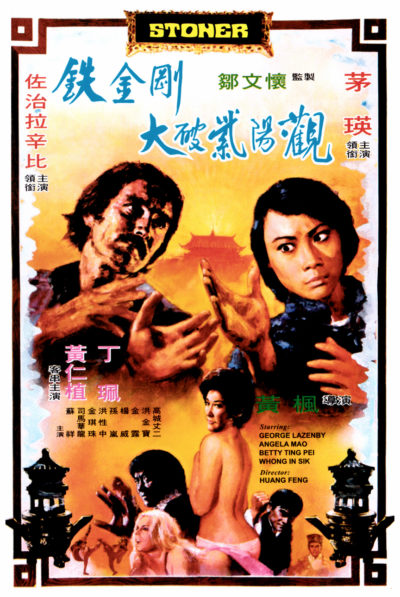 This production had a long, convoluted and quite interesting path to the screen. While Lazenby was always on board, the original plan was for him to be a Western bad guy, going up against Bruce Lee and Sonny Chiba. But Lee’s death – oddly, he was supposed to have had dinner with Lazenby that night – resulted in Chiba quitting, and Warner Bros then also backed out of their worldwide distribution deal. It was reworked as a much smaller film, at less than one-tenth the original budget (although at around $850,000, was still very expensive for the time, location and genre), with Lazenby now teaming up with Angela Mao.
This production had a long, convoluted and quite interesting path to the screen. While Lazenby was always on board, the original plan was for him to be a Western bad guy, going up against Bruce Lee and Sonny Chiba. But Lee’s death – oddly, he was supposed to have had dinner with Lazenby that night – resulted in Chiba quitting, and Warner Bros then also backed out of their worldwide distribution deal. It was reworked as a much smaller film, at less than one-tenth the original budget (although at around $850,000, was still very expensive for the time, location and genre), with Lazenby now teaming up with Angela Mao.
He plays rough, tough Australian cop, Joseph Stoner, who heads for Hong Kong after his sister gets hooked on the new, super-powerful aphrodisiac “happy pills” created in the laboratory of evil drug kingpin, Mr Big (Hwang). She’s Taiwanese cop Angela Li, sent undercover to bring him down. Eventually, they join forces, but this isn’t until well over an hour into the film. To that point, they are each investigating in their own way Mr Big’s activities. Stoner’s approach appears to involve doing an impression of a bull in a china shop, while Li uses a smarter approach, to infiltrate the temple which is the distribution hub, posing as an innocent vendor of soft drinks. Both eventually end up in the same place – a cage in Mr Big’s lair – leading to a creepy scene where she has to fend off a happy pill-crazed Stoner.
It’s interesting that, in both the dubbed and subbed versions, Mao gets top billing ahead of Lazenby, despite the latter’s fame for having played 007 a few years previously. It is very much a two-hander, with each getting their own share of screen time. Lazenby does a surprisingly impressive job with the more physical aspects, and apparently put in a great deal of training. The problem is – as with his portrayal of James Bond – the actor’s inability to convey any emotions with the slightest degree of conviction. Even when talking about his sister, he might as well be reciting sports scores. Still, there’s plenty of funky seventies style to appreciate, such as the rotating desk apparently bought by Mr. Big from a yard sale at a local TV news-room.
Mao is, for our purposes, the true star, and I’d be hard pushed to say this would have been improved by the presence of Sonny Chiba. You have to wait quite a while for any significant action from her though, coming when she sneaks into Mr. Big’s headquarters. This unfolds in a way which suggests Bruce Lee’s foray from Enter the Dragon, and you wonder if this was part of the original script, intended for him before his untimely demise. On the whole though, I’d rather have dispensed entirely with Lazenby, and given the entire film to Mao, for this demonstrates that brains is often more interesting to watch than brawn.
Dir: Huang Feng
Star: Angela Mao, George Lazenby, Betty Ting, Hwang In-shik
a.k.a. The Shrine of Ultimate Bliss
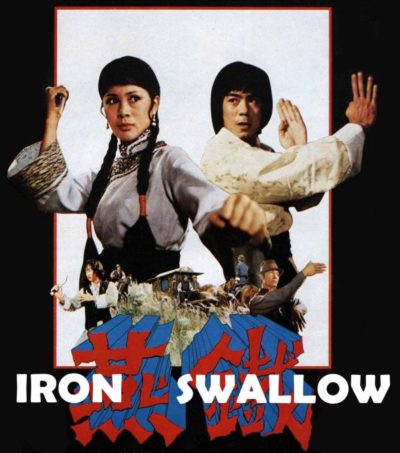 Generally, if someone is roaming the country, carrying out brutal attacks on apparently innocent citizens, blinding and disfiguring them, they’d be the villain of the piece, right? Not so here. For despite such distinctly non-heroic actions, Iron Swallow (Lee) is the heroine, disabling the men she holds responsible for killing her father years earlier. Needless to say, they’re not exactly impressed with the situation. To make matters worse, someone is flat-out killing her targets, intent on covering up something or other, and is trying to make it look like Swallow is responsible, by leaving her trademark darts behind at the scene. There are also two friends (Tao and Chung) rattling around, the son and pupil respectively of the region’s leading martial arts master Chu Hsiao Tien (Yuen), who get involved in the murky situation because Chu is one of Swallow’s targets and has hired a particularly loathsome assassin to bury the case.
Generally, if someone is roaming the country, carrying out brutal attacks on apparently innocent citizens, blinding and disfiguring them, they’d be the villain of the piece, right? Not so here. For despite such distinctly non-heroic actions, Iron Swallow (Lee) is the heroine, disabling the men she holds responsible for killing her father years earlier. Needless to say, they’re not exactly impressed with the situation. To make matters worse, someone is flat-out killing her targets, intent on covering up something or other, and is trying to make it look like Swallow is responsible, by leaving her trademark darts behind at the scene. There are also two friends (Tao and Chung) rattling around, the son and pupil respectively of the region’s leading martial arts master Chu Hsiao Tien (Yuen), who get involved in the murky situation because Chu is one of Swallow’s targets and has hired a particularly loathsome assassin to bury the case.
Murky is, to be honest, putting it mildly, and the plot here appears to have been constructed from finest quality raw ore, taken from the Kung Fu Cliché mine. And I stress the word “raw”, since there doesn’t appear to have been much processing, in the way of logical thought, given to those ideas between their conception and the screen. It’s the kind of kung-fu film where you can’t be sure whether they made the story up as they went along – however, if they had, it would explain a lot of the tedious incoherence. I read another review which called this a martial arts version of I Know What You Did Last Summer, and that’s a decent enough summary. At one point, Chris meandered in and wondered whether this was the source film for Kung Pow: Enter the Fist, based mostly on Swallow’s hair-style. Though she says that for about 40% of period kung-fu films, so it probably doesn’t mean much.
It’s certainly one of those cases where you might as well bring a book, and forget about trying to follow the indigestible lumps of plot between the action scenes. Fortunately, those are decent enough to sustain interest, and relatively copious, particularly in a final third which more or less abandons the plot, replacing it with multiple varieties of fisticuffs. Swallow’s skills are obvious, and given multiple opportunities to shine. It’s a shame that Lee was never allowed to showcase her own identity, in the way Angela Mao received, instead being the victim of a highly dubious marketing campaign which alleged she was Bruce Lee’s sister. Whatever the short-term benefit that brought, it did her career no good in the longer term, and she was all but gone from the screen by the end of the seventies. I have to wonder if whoever came up with that genius idea, was also responsible for the script here…
Dir: Judy Lee, Don Wong Tao, Ting Wa Chung, Yee Yuen
Star: Chang Pei-Cheng
a.k.a. Shaolin Iron Eagle

 This rattled around in pre-production for a while, originally being called Lady Bloodsport, and with the names linked to it being significantly higher in profile: Maggie Q, Shu Qi and Zhiyi Zhang. The end result here is obviously smaller and cheaper – the fights at its core all take place in the bastion of martial arts, a warehouse – and you can’t help but think, “What if…?” However, it’s still thoroughly enjoyable, despite – or, perhaps because of – feeling like a throwback to straightforward movies such as the original Bloodsport, which helped launch the career of Jean-Claude Van Damme in 1988.
This rattled around in pre-production for a while, originally being called Lady Bloodsport, and with the names linked to it being significantly higher in profile: Maggie Q, Shu Qi and Zhiyi Zhang. The end result here is obviously smaller and cheaper – the fights at its core all take place in the bastion of martial arts, a warehouse – and you can’t help but think, “What if…?” However, it’s still thoroughly enjoyable, despite – or, perhaps because of – feeling like a throwback to straightforward movies such as the original Bloodsport, which helped launch the career of Jean-Claude Van Damme in 1988.
The basic approach seems entirely deliberate, and the simplicity works to the film’s benefit. You don’t watch a film with this title for intricate plot or subtle character study; you watch it to see asses being kicked, and there’s enough of that, you’d be hard-pushed to feel cheated. The excuse is the well-worn trope of a martial-arts tournament for women, the kumite, being held in Hong Kong. The last time it happened, it ended in a tie between deadly rivals, Shu (Hofmann) and Wai (K. Wu). They’re now both looking for someone who can fight on their behalf. Shu selects Jane Jones (Johnston), in Hong Kong seeking a father who vanished under murky circumstances years earlier. Wai chooses and trains Ling (J. Wu), a cocky, streetwise fighter. But there are 14 other entrants, hailing from all over the world, including Russia, Australia and Brazil, who must be defeated before the inevitable Jones vs. Ling showdown.
Yes, it’s utterly contrived, not least in not one, but two, master-student threads. If you can’t think of better ways to achieve the same end, you need to watch more movies. Fortunately, it’s salvaged by a quarter of decent performances from the lead women, who take the clichés they’re given by the script, and round them out into at least an approximation of real characters, good enough for the movie’s purposes. Bonus points due, for not inflicting any sappy romance (although Jones’s interactions with the spirit of her father are occasionally on perilously thin ice instead) and also largely avoiding potentially sleazy cheesecake, save for one locker-room pan.
As the tag-line above suggests, this feels very much like an adaptation of a non-existent video-game. As such, it would have helped if they’d mixed up the environments for the fights a bit, in the name of variety. This is a minor quibble, however, and what you get are some well-crafted slabs of action, showcasing various styles and approaches. Outside of Jones and Ling, the character which stuck in our mind most was likely Mayling Ng’s monstrous Svietta, freed from a Russian prison for the kumite. All tattoos and snarls, she might have made a better “final boss” for the heroine than Ling, who is perhaps a little too sympathetic. Despite any flaws, it’s a brisk tale, energetically told, and with plenty to commend its no-nonsense approach.
Dir: Chris Nahon
Star: Amy Johnston, Muriel Hofmann, Jenny Wu, Kathy Wu
 This is confusing. For the IMDb lists a completely different film by the same title – also made in 1991 and starring Moon Lee. That one stars Simon Yam: this one doesn’t. Meanwhile, Amazon has Yukari Oshima in the cast – I may have blinked and missed her, but more likely she was in the other one. It is also, despite the title, entirely unrelated to the Angel series, though did remind me I’ve not yet got round to reviewing parts two and three of that. If you see it referred to as Mission Kill and Mission of Condor too, I think that’s the “other” Angel Force as well; one site even refers to this movie as Lethal Blood 2, although it bears no relation to the first movie there either. I hope this helps…
This is confusing. For the IMDb lists a completely different film by the same title – also made in 1991 and starring Moon Lee. That one stars Simon Yam: this one doesn’t. Meanwhile, Amazon has Yukari Oshima in the cast – I may have blinked and missed her, but more likely she was in the other one. It is also, despite the title, entirely unrelated to the Angel series, though did remind me I’ve not yet got round to reviewing parts two and three of that. If you see it referred to as Mission Kill and Mission of Condor too, I think that’s the “other” Angel Force as well; one site even refers to this movie as Lethal Blood 2, although it bears no relation to the first movie there either. I hope this helps…
Regardless, I wondered early on if this would even qualify, as May (Lee) takes a back seat, playing second banana to her boss, Peter (Lam). He has been tasked with rescuing kidnapped Westerner Harrison, stashed away after his capture, deep in the Burmese jungle by local drug lord, Khun Sa [who appears to have been a real person]. After putting together a team, on virtually the eve of the recovery mission, Peter is gunned down in an attempted hit, and it’s up to May to lead things. There are problems both outside and inside the team. A mole is leaking information on the mission to the people they are after, and the first guy Peter recruits, Benny (Ng), turns out to be a borderline psycho, who gets a bit rapey with a captured enemy. It’s up to May to complete the mission, get out alive, and then figure out who is the informant.
Right from the start here, there’s no shortage of action. Though a bit too much of it consists of two group spraying automatic gunfire at each other, through thick jungle foliage and with all the accuracy of Imperial Stormtroopers. While I am never averse to seeing a guard-tower explode in a good, giant fireball, there is a limit to the appeal of such things, and it is certainly reached here, well before the arrival of what may be the first deus ex helicopter in cinema history. I was also amused by the painfully early nineties approach to both mobile phones the size of bricks, and high-tech searches represented by a computer screen where the text largely consists of word-processor installation instructions. No wonder the team ended up with Psycho Benny.
Fortunately, the guns here jam or run out of ammo with regularity which could be concerning if I were a weapons manufacturer. As a viewer though, the film is on far more solid ground when dealing with the hand-to-hand action. Lee leads from the front with some fights that showcase her speed and agility to good effect. The most notable of these is a battle against Fujimi Nadeki after the near-assassination of Peter, in which May chases the killer through the streets on a motorcycle, to a half-demolished building. A savage gun-battle follows, notable not least for May’s point-blank execution of one man, ending with her going up against Nadeki. While it forms the high point, more or less any time Lee puts the gun down is a good indication you should start paying greater attention here.
Dir: Shan Hua
Star: Moon Lee, Wilson Lam, Hugo Ng, Fong Lung
a.k.a. Tian shi te jing
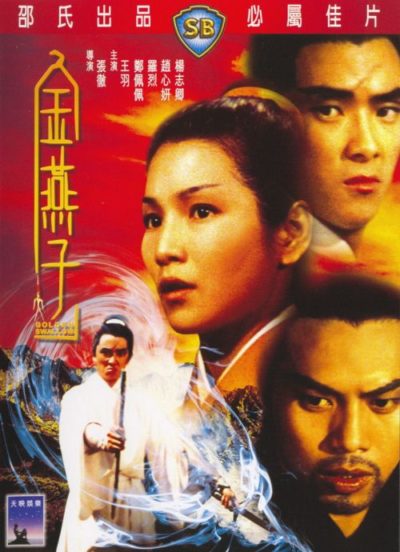 If this seems somewhat familiar, it’s because it is not dissimilar to Iron Swallow, reviewed just a couple of weeks back. However, this is the official sequel to Come Drink With Me, in which Cheng reprises her character of Golden Swallow, rather than being the Taiwanese knock-off. Ms. Swallow is living a fairly quiet life, fighting for the rights of the underdog, etc. along with the aid of Golden Whip (Lo). Their peace is disturbed by the actions of Silver Roc (Wang Yu), who is carrying out various massacres, and leaving Swallow’s trademark darts at the scene, in order that she gets blamed for the crimes.
If this seems somewhat familiar, it’s because it is not dissimilar to Iron Swallow, reviewed just a couple of weeks back. However, this is the official sequel to Come Drink With Me, in which Cheng reprises her character of Golden Swallow, rather than being the Taiwanese knock-off. Ms. Swallow is living a fairly quiet life, fighting for the rights of the underdog, etc. along with the aid of Golden Whip (Lo). Their peace is disturbed by the actions of Silver Roc (Wang Yu), who is carrying out various massacres, and leaving Swallow’s trademark darts at the scene, in order that she gets blamed for the crimes.
Turns out this is Roc’s idea of courtship, figuring it’ll force Swallow to track him down – and not with the aim of serving a restraining order, as I’d have said was more likely. Odder still, this “massive body count in lieu of a bouquet of flowers” concept actually appears to work, at least piquing Swallow’s interest, and thus setting up a love triangle between Swallow, Roc and Whip. It’s only interrupted by the arrival on the scene of Poison Dragon (Yeung), and the two suitors put aside their scheduled duel to the death on top of a mountain, in order to take care of the real villain.
Despite the title – particularly the alternate one, which promises a whole level of action the film isn’t interested in delivering – and lead billing, this is significantly less about Swallow than Roc. And that’s a shame – Wang Yu would get plenty of his own opportunities to shine, he didn’t need to be hijacking the limited chances given to Cheng. Took me a little while to work out, too, that his character is named after a mythical giant bird, not a boulder. The references to “soaring rocks” were quite confusing for a while, until I figured this out.
The fights are okay, rather than impressive. They’re certainly not helped by Chang’s style, apparently an early ancestor of the MTV style of shooting action. This involves the camera being pushed too close in to capture the skills of the participants, and a primitive version of steadicam, which is certainly not steady in the slightest. I didn’t like it. I had high hopes for a scene which began with Swallow sitting quietly in a tea-house, which seemed to be echoing one of the most memorable sequences from Come Drink With Me, but it was little more than a nod, and was over before it had properly begun.
I wasn’t all that impressed with Drink, finding it more influential than entertaining. But it is still considerably better than this, which never gets off the ground thanks to a laughable plot, and carries out something perilously close to a bait and switch, with the heroine of its title reduced to a supporting role. What a waste of Cheng’s talents.
Dir: Chang Cheh
Star: Cheng Pei-pei, Jimmy Wang Yu, Lo Lieh, Yeung Chi-hing
a.k.a. The Girl with the Thunderbolt Kick
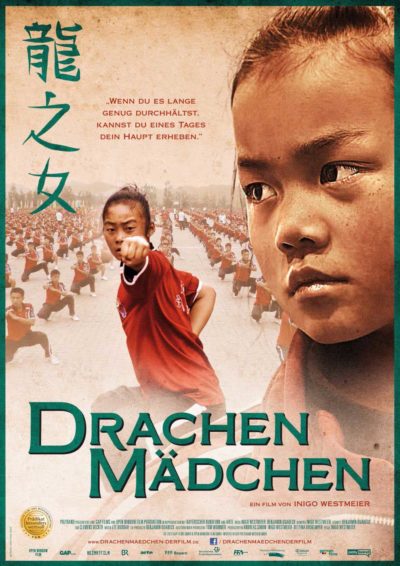 If you’re familiar with Jackie Chan’s life story, you’ll know he (along with fellow future start Sammo Hung and Yuen Biao) was basically brought up in a Peking Opera school, where he learned martial arts and acrobatics as well as theatrical skills. Discipline there was notoriously strict – the film Painted Faces gives a good idea of what it was like. But that was the sixties. Surely no such abusive educational regime exists nowadays?
If you’re familiar with Jackie Chan’s life story, you’ll know he (along with fellow future start Sammo Hung and Yuen Biao) was basically brought up in a Peking Opera school, where he learned martial arts and acrobatics as well as theatrical skills. Discipline there was notoriously strict – the film Painted Faces gives a good idea of what it was like. But that was the sixties. Surely no such abusive educational regime exists nowadays?
Well… This documentary suggests otherwise, though the scale is rather different. For the Shaolin Tagu school that’s the subject here says it has 35,000 staff and pupils on a half-million square metre campus. When you see the opening, the screen filled from side to side and top to bottom with synchronized martial artists, it’s not implausible. However, the reasons why parents send their children to these places haven’t changed a lot. Typically the family is too poor, or the kids are too much of a handful, possibly heading into delinquency, and they believe the discipline will straighten them out.
The film focuses on some of the girls, some as young as nine, enrolled in the school, including one who had run away in the middle of the second year, and returned to her family. As well as the pupils, there are interviews with the coaches, the head of the school (“A community’s backbone is shaped by rules,” he says. “In here, those rules are very strict.”) and the chief monk at the nearby Shaolin monastery, who offers a different (rather more laid-back!) perspective on what martial arts are about. There isn’t much in the way of narrative here. While there are mentions of a tournament, I didn’t realize it had taken place, until one of the participants was reporting to her disappointed father that she had failed to win first place. Some obvious questions are unanswered too, such as who is paying for this? Are these places state-sponsored?
Although the presence of the documentary crew may have reined in the harsher side of life at the school, the girls have no problem detailing the corporal punishment dished out, it seems at will, by the teachers, or the insect-contaminated food. There’s one scene where the girls compare scars and try to one-up each other, which plays disturbingly like a teen version of the similar sequence in Jaws. But it’s about the only one which sticks in the mind or goes any significant difference between the fairly obvious. I get the feeling we in the West are supposed to look on this disapprovingly, but there isn’t enough digging behind the facade to justify it. For you could likely make something not dissimilar about any high-pressure training environment here – say, for gymnastics. The main difference would probably be that, here, parents have other options…
Dir: Inigo Westmeier
Star: Xin Chenxi, Chen Xi, Guan Luolan, Yang Ziyu
a.k.a. Drachen Mädchen
 This 1982 Taiwanese flick proves that, if you can’t afford to go big, you might as well go… Actually, you might as well go on regardless, because with enough enthusiasm, the surreal results can sometimes be thoroughly entertaining, albeit certainly not in a way any normal viewer would call “good”. I was still thoroughly amused, albeit more often at the film than with it, for this is sheer lunacy – yet lunacy of a fascinatingly off the wall kind. It begins with a couple suddenly deciding that they don’t want anything to do with their erstwhile master, the Blue Devil. Maybe the human sacrifice was the giveaway. They head off, with their newborn baby, only to be caught by his minions. Everyone gets buried in an avalanche and killed, except the baby, who is brought up by wolves (!) in an ice-cave, and fed a magical ginseng root by them (!!) that gives her amazing superpowers (!!!).
This 1982 Taiwanese flick proves that, if you can’t afford to go big, you might as well go… Actually, you might as well go on regardless, because with enough enthusiasm, the surreal results can sometimes be thoroughly entertaining, albeit certainly not in a way any normal viewer would call “good”. I was still thoroughly amused, albeit more often at the film than with it, for this is sheer lunacy – yet lunacy of a fascinatingly off the wall kind. It begins with a couple suddenly deciding that they don’t want anything to do with their erstwhile master, the Blue Devil. Maybe the human sacrifice was the giveaway. They head off, with their newborn baby, only to be caught by his minions. Everyone gets buried in an avalanche and killed, except the baby, who is brought up by wolves (!) in an ice-cave, and fed a magical ginseng root by them (!!) that gives her amazing superpowers (!!!).
20 years later, the Blue Devil has become a bigger problem, so Lee (Fung) and his comic-relief sidekick Wong (Pa Gwoh) have headed up the mountain in search of the only thing capable of defeating the Blue Devil. Which just happens to be the magical ginseng root eaten by our heroine. She is now bouncing round the mountain in her fur costumes, rending innocent bunny rabbits and chickens limb from limb. And, as the tagline above makes clear, I’m pretty sure those weren’t stunt bunnies. Lee fixes her busted spine with a bit of impromptu chiropractic care, befriends her and teaches her to speak. They then go their separate ways. Lee turning to the dark side and becoming a minion of the Red Devil, while Snowflower (as she has been named) swings around from trees for a bit – as wolves apparently do in Taiwan – then gets drunk in a village tavern and is thrown into a well by irate locals.
This is part of her heroic journey, with the eventual goal of taking revenge on the man who killed her parents. To get there, she’ll also have to go through a number of battles, get some semi-useful information from a white-haired guy with really long eyebrows, and there will be a not-very stunning revelation about who the Blue Devil actually is. Let’s just say, I think Ling might have been a fan of the original Star Wars movies. One of her preferred tactics for dealing with opponents is to grab them firmly, then yank off their heads or tear them in half, so it appears those animals did not die in vain, and were simply practice. But perhaps the maddest moment is when one of her allies is set on fire: Snowflower tears into her own arm and uses the arterial spray to put the flames out. That’s hardcore.
 Dull, it ain’t, and was clearly a work of love for Ling, who wrote, directed and starred in the movie, playing the heroine as well as her mother. Which is quite surprisingly, since women are generally more… sensible than this. It’s quite possibly one of the most insane films ever created by a female director. The luridly cheap execution, for example on the visual effects, only enhances the feeling you’ve wandered into someone else’s drug-propelled nightmare. This, mind you, was all based on a viewing of the subtitled version. There’s a dubbed one which adds an extra level of surrealness, if Wikipedia is to be believed, calling it “notable for its bizarre vocal performances,” and saying the Blue Devil “speaks like American cartoon character Yosemite Sam.” It’s almost enough to make me wish I’d seen that version.
Dull, it ain’t, and was clearly a work of love for Ling, who wrote, directed and starred in the movie, playing the heroine as well as her mother. Which is quite surprisingly, since women are generally more… sensible than this. It’s quite possibly one of the most insane films ever created by a female director. The luridly cheap execution, for example on the visual effects, only enhances the feeling you’ve wandered into someone else’s drug-propelled nightmare. This, mind you, was all based on a viewing of the subtitled version. There’s a dubbed one which adds an extra level of surrealness, if Wikipedia is to be believed, calling it “notable for its bizarre vocal performances,” and saying the Blue Devil “speaks like American cartoon character Yosemite Sam.” It’s almost enough to make me wish I’d seen that version.
Even without it, this remains jaw-droppingly bizarre, and there’s almost no written description that can possibly hope to do it justice. Fortunately, YouTube exists, and you can now appreciate this cinematic treat directly – complete with the dubbing! – rather than through the poor approximation of my second-hand words. I’d suggest having a few alcoholic beverages to hand, because you’re going to need them. For you will not have seen anything quite like this before…
Dir: Ling Chang
Star: Ling Chang, Sek Fung, Pa Gwoh
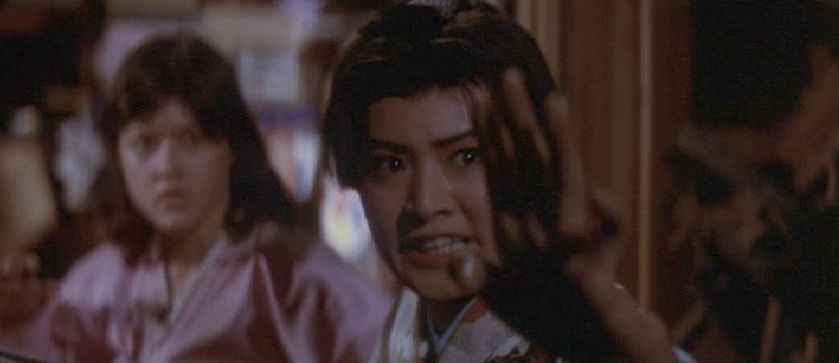
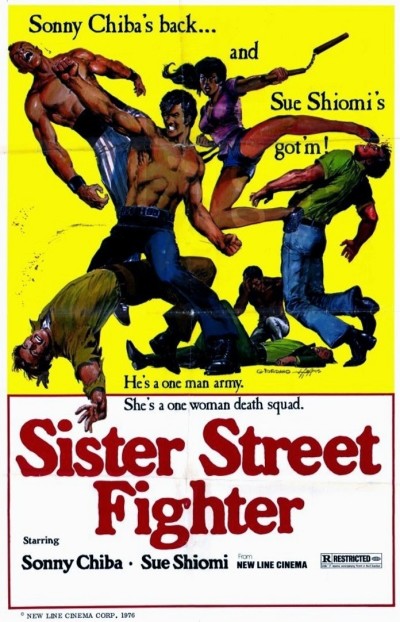
 I have reviewed this previously, way back at the birth of the site, as part of the Women Who Kick Butt box-set, where it was easily the best film present. However, that was in a dubbed version, and having recently got hold of a copy in the original Japanese, I thought it deserved a re-watch. I’m pleased to report it remains a supremely loopy bit of fun, fully meriting the seal of approval and deserving of its own page, However could it be otherwise, with dialogue such as the title caption above, or the unforgettable line, “I killed fifty bulls with my bare hands in South America, you know.” It’s 70’s martial arts plot #26: central character goes to look for missing relative. In this case, it’s Tina (Shihomi), whose brother, an undercover cop, vanished while looking into a Japanese drug cartel. She agrees to follow in his footsteps, and soon finds the gang, under boss Hayashi (Yamamoto), handle snoopers with extreme prejudice. As that caption suggests, they bring the merchandise in using heroin-infused wigs(!), and the eccentric boss is now keeping Tina’s brother as a plaything in his basement – presumably alongside the “men who know where they are and care, but don’t drink.”
I have reviewed this previously, way back at the birth of the site, as part of the Women Who Kick Butt box-set, where it was easily the best film present. However, that was in a dubbed version, and having recently got hold of a copy in the original Japanese, I thought it deserved a re-watch. I’m pleased to report it remains a supremely loopy bit of fun, fully meriting the seal of approval and deserving of its own page, However could it be otherwise, with dialogue such as the title caption above, or the unforgettable line, “I killed fifty bulls with my bare hands in South America, you know.” It’s 70’s martial arts plot #26: central character goes to look for missing relative. In this case, it’s Tina (Shihomi), whose brother, an undercover cop, vanished while looking into a Japanese drug cartel. She agrees to follow in his footsteps, and soon finds the gang, under boss Hayashi (Yamamoto), handle snoopers with extreme prejudice. As that caption suggests, they bring the merchandise in using heroin-infused wigs(!), and the eccentric boss is now keeping Tina’s brother as a plaything in his basement – presumably alongside the “men who know where they are and care, but don’t drink.”
Oh, and Hayashi also collects martial artists: “Some rich men buy race horses or keep an expensive dog as a pet. But I keep unusual humans instead of animals. It amuses me.” This includes everything from an expert in the Okinawan Kobudo, a chained sickle, through to a pack of Thai kickboxers called the “Amazon Seven.” There’s also a guy with a mohawk who shoots poisoned darts from his blowgun, and bunch of fairly ineffective minions, who walk around wearing what look kinda like ski-masks made of straw. Wisely, they remove these before going into battle, although this does make me wonder what the point is. These and more will all, at some point or other, be faced down by Tina and/or her own allies, including colleagues of her brother, Sonny Hibachi (Chiba) and Emmy Kawasaki (Hayakawa), as well as a ballet-school teacher, because everyone in Japan knows some version of karate, it appears. [I should also mention the unfortunate logo of the karate school is a swastika!] Though Tina’s most startling skill is her ability to fall hundreds of feet from a high bridge, then re-appear without the slightest explanation as to how she survived.
Yamaguchi’s directorial style appears to consist of tilting the camera semi-randomly, leading to some sequences being Everyday Etsuko Shiomis, seen from unusual angles. But he also is smart enough to stand back when appropriate, letting her and everyone else do their thing, and this is when the film earns its keep. Watching Shiomi duel with nunchakus is worth the cost of admission alone, with the rest of the fights, and the general lunatic approach, merely a bonus. Released almost exactly a year after Enter the Dragon, the debt owed to that classic is certainly clear, not least in the tiger claws wielded by Hayashi. If some performances may be on the functional side (watch the drug withdrawal scene for truly epic over-acting), it still does a better of job of repaying its debts than many other imitators of the time, being an enjoyable slab of excessive kung-fu action in its own right.
Dir: Kazuhiko Yamaguchi
Star: Etsuko Shihomi, Shohei Yamamoto, May Hayakawa, Sonny Chiba
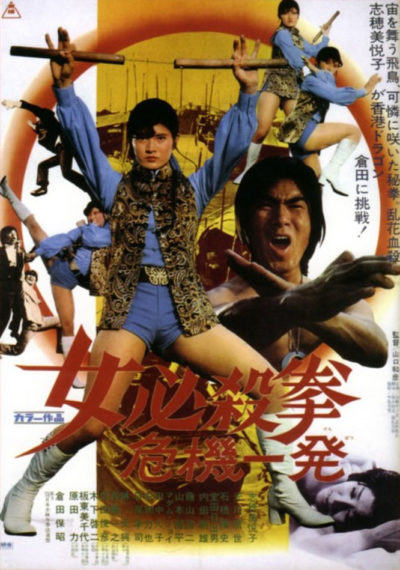 Even before the original film was released, the studio was spurred into making a swift follow-up, and the rush into production shows itself in a plot more than somewhat similar to its predecessor. Koryu Lee (Shiomi) looks for Birei, a friend from high-school, at the request of Birei’s father, after she vanishes from Hong Kong. She tracks Birei down in Japan where the girl is being used as a mule by a diamond-smuggling gang, operating under the front of a company owned by Kazunari Osone (Murota). They don’t take kindly to Koryu’s investigation, and send a range of thugs to stop her, which only encourages Koryu, naturally. However, turns out there’s a more personal connection, since her sister Bykuran (Mitsukawa) is working for Osone – both on her feet and her back, if you know what I mean…
Even before the original film was released, the studio was spurred into making a swift follow-up, and the rush into production shows itself in a plot more than somewhat similar to its predecessor. Koryu Lee (Shiomi) looks for Birei, a friend from high-school, at the request of Birei’s father, after she vanishes from Hong Kong. She tracks Birei down in Japan where the girl is being used as a mule by a diamond-smuggling gang, operating under the front of a company owned by Kazunari Osone (Murota). They don’t take kindly to Koryu’s investigation, and send a range of thugs to stop her, which only encourages Koryu, naturally. However, turns out there’s a more personal connection, since her sister Bykuran (Mitsukawa) is working for Osone – both on her feet and her back, if you know what I mean…
Sure, it’s smuggling diamonds not drugs, and Koryu’s sister instead of her brother who is in bed with the criminals. But if you watch this back to back with the original, it’s almost going to seem like a mockbuster rather than a sequel, albeit made by much the same people. One semi-significant difference is that replacing Sonny Chiba, you have Kurata, playing a martial-arts master who joins the Osone gang with his own agenda. The opponents for our heroine are still the same selection of fighters with different talents, each introduced with a caption describing their origin. But these seem significantly more restrained than first time round, outside of the transsexual killer with her lethal fingernails.
The main problem is Yamaguchi’s direction, apparently considerably less stable than previously. It was a while ago I watched the first film, so perhaps I just didn’t notice it there, but for this entry he seems to have developed a terrible habit of moving the camera enthusiastically during Shihomi’s fight sequences. Which might have worked better, if the SteadiCam had arrived in Japanese cinema at the time of shooting. Instead, the results more closely resemble handing the camera to a amphetamine-crazed chimp, and are an unpleasant distraction, rather than providing any kind of enhancement to proceedings. It’s a blessed relief, whenever things calm long enough for viewers to appreciate the actual skill possessed by Shihomi, with her use of the nunchakus remaining a particular highlight.
The film does seem to have jacked up the exploitation aspects, with surprisingly disturbing (for the mid-seventies time) gore, in particular some eyeball violence, with what feels like more nudity as well. These are occasionally combined, such as the removal without anaesthetic of the smuggled diamonds, from the buttocks of the woman smuggling them. That’ll leave a mark. Not sure that’s necessarily a plus, since Shihomi’s wholesome and earnest intensity was one of the pleasures in the first film, making it stand out from the more common and salacious “pinky violence” cousins, that this sequel appears to be aping.
Dir: Kazuhiko Yamaguchi
Star: Etsuko Shihomi, Hideo Murota, Yasuaki Kurata, Tamayo Mitsukawa
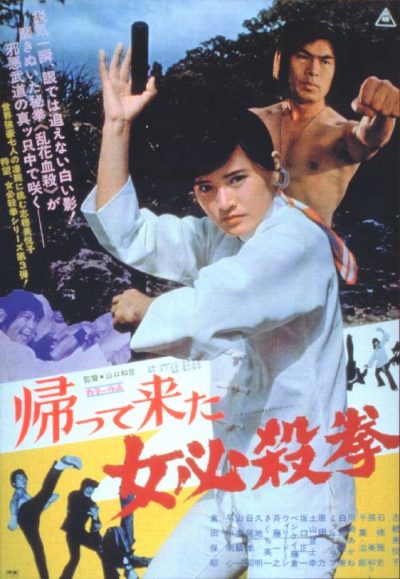 The third in the series is something of a return to form, not least because Yamaguchi goes back to holding the damn camera steady. But, really: another friend/relative has vanished into the clutches of a yakuza smuggling ring? At this point, it’s going beyond the realms of coincidence and, as Oscar Wilde (somewhat) said, now looks like carelessness. In this case, it’s cousin Shurei, though it’s not entirely clear if she is the cousin of Koryu (Shihomi) or the detective who gives our heroine her mission. The details are largely irrelevant, however. For what matters is that Koryu has not yet touched dry land after her arrival in Yokohama, accompanied by Shurei’s adorable little daughter Rika, when she is ambushed on the pier.
The third in the series is something of a return to form, not least because Yamaguchi goes back to holding the damn camera steady. But, really: another friend/relative has vanished into the clutches of a yakuza smuggling ring? At this point, it’s going beyond the realms of coincidence and, as Oscar Wilde (somewhat) said, now looks like carelessness. In this case, it’s cousin Shurei, though it’s not entirely clear if she is the cousin of Koryu (Shihomi) or the detective who gives our heroine her mission. The details are largely irrelevant, however. For what matters is that Koryu has not yet touched dry land after her arrival in Yokohama, accompanied by Shurei’s adorable little daughter Rika, when she is ambushed on the pier.
Having survived that, she links up with Shurei’s sister, Reika, then goes to meet “Suzy Wong”, who supposedly knows Shurei’s whereabouts. Koryu learns Shurei has become the mistress of Oh Ryu Mei (Yamamoto), “the shadow ruler of Yokohama’s Chinatown,” before Suzy becomes another in what turns out to be quite a lengthy string of dead bodies. For Mr Oh’s approach to henchmen employment is to have the potential candidates fight each other in death matches to determine who gets the four open spots as his enforcers. One of these ends up being Takeshi Kurosaki (Kurata), though if you’ve seen the second film, you will not be at all surprised to learn that he has his own agenda once more. Really, it’s like they’re not even making a token effort in terms of the script at this point.
That said, I enjoyed this one significantly more: as noted, the cinematography is less flailing, there’s no shortage of action, and there are some surreal touches (both deliberate and, I suspect, accidental) that enliven proceedings. For example, [mild spoiler] Mr Oh is wheelchair-bound, though this certainly doesn’t stop him from being wheeled around to slap under-performing minions silly. Except, at the end, he suddenly leaps from his wheelchair into battle. I guess he was just being a lazy bastard the rest of the time. In the “accidental” category, there’s the saxophone rendition of Danny Boy, which accompanies the Very Serious conversation between Koryu and Suzy, in a spectacular display of inappropriateness.
I wondered why chunks of this felt so familiar, and eventually discovered I had reviewed this previously, back in September 2008. I wasn’t as impressed at that point, awarding it only two stars at that point (though I appear to have been equally amused then by the whole Danny Boy thing). Either my tastes have changed over the intervening years, or perhaps I was influenced by watching this in close proximity to the inferior second film? But, if I ever become an evil overlord, and have a mortal enemy in my grasp, I will not stop a henchman about to kill them, with a quip such as, “The crows will feed on her by morning anyway.” That never ends well for the evil overlord…
Dir: Kazuhiko Yamaguchi
Star: Etsuko Shihomi, Yasuaki Kurata, Rinichi Yamamoto, Akane Kawasaki
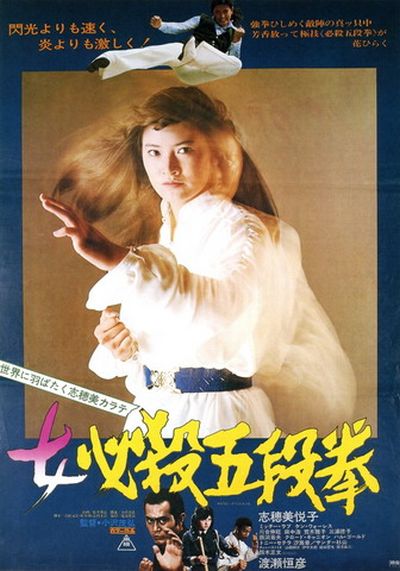 The fourth entry marked several changes, although given it was also the final one, that suggests these were not considered too successful. A new director was brought in; Ozawa is best known for The Streetfighter, starring Sonny Chiba, which inspired the spin-off series here, though this was the last of the 30-odd films in his career. Shihomi also plays a different character from the earlier movies: Kiku Nakagawa, the daughter of an upwardly-mobile kimono designer who is trying to marry her off to a salaryman. Kiku is having none of it, not when her Okinawan friend, Michi (Love), needs help. For Michi’s half-black stepbrother, Jim (Wallace), has been targeted by the drug-smugglers he has fallen in with, who are using a movie studio as a front for their activities, under its owner Fujiyama (Kawai).
The fourth entry marked several changes, although given it was also the final one, that suggests these were not considered too successful. A new director was brought in; Ozawa is best known for The Streetfighter, starring Sonny Chiba, which inspired the spin-off series here, though this was the last of the 30-odd films in his career. Shihomi also plays a different character from the earlier movies: Kiku Nakagawa, the daughter of an upwardly-mobile kimono designer who is trying to marry her off to a salaryman. Kiku is having none of it, not when her Okinawan friend, Michi (Love), needs help. For Michi’s half-black stepbrother, Jim (Wallace), has been targeted by the drug-smugglers he has fallen in with, who are using a movie studio as a front for their activities, under its owner Fujiyama (Kawai).
This takes a long while to get going, with Kiku having precious little to do in terms of action until the final 20 minutes or so. When it does, have to say, she and Michi deliver one of the best fights of the entire series, in an extended brawl around the film lot. Until then, it’s as much social commentary as anything, with the siblings the target of prejudice for their mixed-race nature [something which also formed a significant aspect of Rika the Mixed-Blood Girl and its sequels]. This is also more explicitly feminist than its predecessors, and not only in the arranged marriage Kiku wants to avoid. When that falls through, her father tries to set her up with Detective Suji Takagi, but he’s an unrepentant chauvinist and tells Riku: “Men are attracted to a woman’s gentleness. Cooking good food for your husband and raising your children well – isn’t that what makes a woman happy?” Showing remarkable restraint, she somehow managed to avoid punching his lights out as a counter-argument.
There seems to be a bit more comedy in this one, and additionally, it seems somewhat brave of Ozawa to make a film linking a movie studio to the Yakuza, given the long-standing whispers linking Toei, the company behind this series, to organized crime in the seventies. [According to Federico Varese, “Bosses not only took a keen interest in their portrayal and demanded to pre-approve the content of movies but also encouraged the production of hagiographies about themselves and their gangs.”] Maybe that explains why it was the last movie he ever directed… While this was also the last entry in the Sister Street Fighter series, Shihomi continued acting for another decade, before marrying fellow-actor Tsuyoshi Nagabuchi, marrying him and retiring from acting at the ripe old age of thirty-one. However, these four features likely remain the definitive works in her filmography, showcasing her skills, and putting them front and centre, where they belong.
Dir: Shigehiro Ozawa
Star: Etsuko Shihomi, Mitchi Love, Ken Wallace, Nobuo Kawai
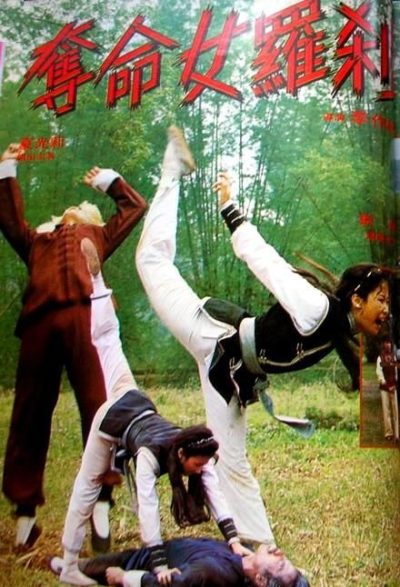 This appears to have been virtually the sole starring role for leading lady Shen, and that’s a shame. While, unfortunately, the only way you can see this is a badly cropped, English language version, her martial arts talents are undeniable. Chris caught the last 15 minutes on her lunch-break, and once she saw the skills on display, went from mocking the dubbing to yelling “Kick him in the balls!” at the TV. Repeatedly.
This appears to have been virtually the sole starring role for leading lady Shen, and that’s a shame. While, unfortunately, the only way you can see this is a badly cropped, English language version, her martial arts talents are undeniable. Chris caught the last 15 minutes on her lunch-break, and once she saw the skills on display, went from mocking the dubbing to yelling “Kick him in the balls!” at the TV. Repeatedly.
She plays Lu Ling Chi, who is delivering goods with her husband in the countryside when they’re attacked by a band of robbers. He is killed; she raped and left for dead. She’s rescued by a conveniently passing Buddhist priestess (Tai), who nurses our heroine back to health and, after some doubts as to the nature of her mission, teaches her kung-fu. Three years of training later, Lu goes undercover to infiltrate the gang, in the process, setting a new record for “least convincing male impersonator”, even by the low standards of martial arts films. She works her way up the chain, yet still lacks the skills necessary to best their leader, Kwong Wu Chi (Peng). However, she meets a woman (Yeung, I believe, though she’s not in the IMDb listing), crippled by Kwong and reduced to working as a prostitute. Her father used to be Kwong’s kung-fu master, and she offers to give Lu that techniques which will take him down.
The stuff between the fights is mostly blandly inoffensive, following the standard tropes of the genre, such as training montages, while Lu perfects her skills, under both her teachers. Though it is certainly unusual that both those are martial arts mistresses, rather than masters, making this an almost literal war of the sexes. But the presentation, in particularly the ludicrously inappropriate dubbing, reduces the film to something you might find at 3am in the morning on the El Rey network. [It’s not all the dubbing: Kwong’s blond wig doesn’t exactly encourage solemnity] Similarly, the reduction of the frame to a strict 4:3 ratio does the abilities of the stars absolutely no service at all.
It still isn’t enough to conceal the expertise of the participants though, with even the training montages showcasing Shen’s extraordinary flexibility. There’s a genuine sense of progression over the course of the film, with Lu learning new techniques and building them into her arsenal. For example, she learns how to attack her enemy’s joints from the priestess, and that’s seen a lot against the lower minions. However, it proves ineffectual against Kwong, and she needs to adopt different tactics, radically different from her early bouts. This allows Shen to demonstrate a number of styles, and if some are better than others, the overall impact remains impressive. Below, find a sample of her skills: I love, in particular, the way she disarms the gym owner, then discards the weapons obtained! I have to wonder why she never received any further chances to shine as a lead; whatever the reason, it’s probably our loss.
Dir: Lee Tso Nam
Star: Shen Kwan Li, Peng Gang, Tai Chi-Hsia, Sharon Yeung Pan-Pan